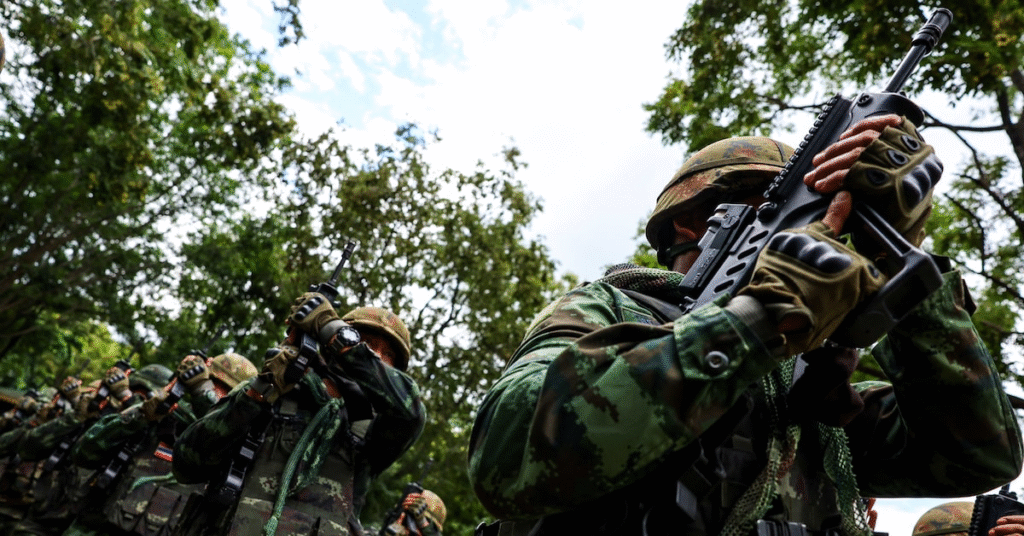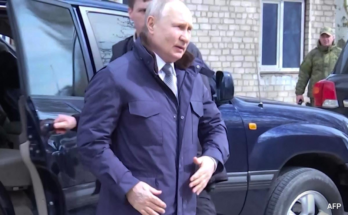BANGKOK/PHNOM PENH, July 24, 2025 — Tensions between Thailand and Cambodia reached a boiling point on Thursday as Thailand deployed six F-16 fighter jets to conduct airstrikes on Cambodian military targets, marking a significant escalation in a long-standing border dispute. The Thai military confirmed that one of the jets successfully struck and destroyed a Cambodian military target, while the remaining jets were positioned for potential further action. In response to the intensifying conflict, Thailand announced the immediate closure of all land border crossings with Cambodia, severely restricting movement and trade between the two Southeast Asian neighbors.

The clashes, which erupted early Thursday morning, were centered around disputed territories along the 508-mile border, particularly near the ancient Ta Moan Thom and Preah Vihear temples. Both nations accused each other of initiating the violence, which has already claimed at least 12 lives, including 11 Thai civilians and one soldier, according to Thai health officials. Cambodia’s Defense Ministry reported that Thai jets dropped two bombs on a road near the UNESCO-listed Preah Vihear temple, condemning the strikes as “reckless and brutal military aggression” that violated Cambodia’s sovereignty.
The conflict follows months of deteriorating relations, sparked by a May incident in which a Cambodian soldier was killed in a border skirmish and exacerbated by a recent landmine explosion that injured five Thai soldiers, one of whom lost a leg. Thailand’s Foreign Ministry accused Cambodia of targeting civilian areas, including a hospital and a gas station in Sisaket province, where a fire caused significant damage. Cambodia, in turn, claimed its forces acted in self-defense after Thai troops allegedly violated territorial agreements by deploying barbed wire near Ta Moan Thom temple.

Thailand’s acting Prime Minister Phumtham Wechayachai described the situation as “delicate” and emphasized that no formal declaration of war had been made. “Fighting must stop before negotiations can begin,” he told reporters, asserting Thailand’s commitment to international law. Meanwhile, Cambodian Prime Minister Hun Manet appealed to the United Nations Security Council for an urgent meeting to address what he called Thailand’s “unprovoked and premeditated military aggression.” Cambodia also downgraded diplomatic ties, recalling all staff from its Bangkok embassy and expelling Thai diplomats from Phnom Penh.
The violence has displaced over 40,000 Thai civilians from 86 villages near the border, with many seeking refuge in temporary shelters in Surin province. Thailand’s Education Ministry ordered the closure of 582 schools in the affected provinces of Surin, Sisaket, and Buriram, some of which are now serving as evacuation centers. Cambodia reported evacuations of students and teachers from border areas but has not disclosed casualty figures.

Regional leaders expressed alarm over the escalating conflict. Malaysia, the current chair of ASEAN, urged both sides to exercise restraint, with Prime Minister Anwar Ibrahim offering to mediate. Japan and China also called for de-escalation through dialogue, emphasizing the importance of stability in Southeast Asia.The border dispute, rooted in colonial-era demarcations, has long fueled nationalist sentiments in both countries. The current clashes, the deadliest since 2011, have reignited debates over sovereignty and raised fears of further violence. As both nations bolster their military presence, the international community watches closely, hoping for a peaceful resolution to avert a broader regional crisis.
Cambodia has issued a stern warning to Thailand, declaring it has “no choice” but to respond with military force following reports of a Thai incursion along their shared border. The escalating tensions, centered around disputed territory near the Preah Vihear temple, mark a significant deterioration in relations between the two Southeast Asian neighbors.Cambodian Defense Minister Tea Banh announced in a press conference today that Thai troops had crossed into Cambodian territory late Wednesday, prompting a swift mobilization of forces. “We have exercised restraint, but Cambodia will not tolerate violations of our sovereignty,” Tea stated. “If Thailand continues its aggression, we will respond with necessary force to defend our land.”The contested area, a long-standing flashpoint, has seen sporadic clashes since a 1962 International Court of Justice ruling awarded the Preah Vihear temple to Cambodia, though surrounding land remains disputed. Thai officials have yet to comment on the alleged incursion, but sources in Bangkok suggest the move may be tied to domestic political pressures.Regional analysts warn that escalation could destabilize the region, with ASEAN urging both nations to pursue dialogue. The United Nations has also called for de-escalation, citing the risk of broader conflict. Cambodia has reportedly deployed additional troops to the border, while Thailand is said to be reinforcing its positions.


